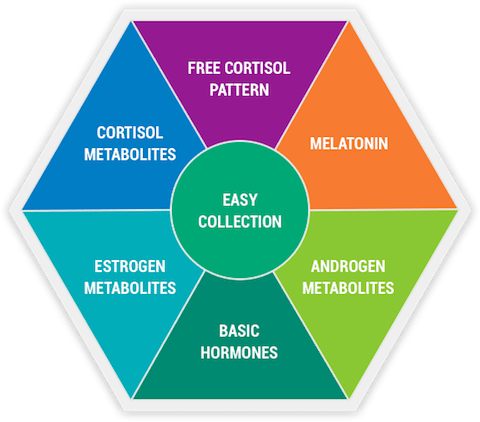

Comprehensive Female Hormone Testing is an innovative way to test what is actually going on in your body. Hormones pathways are complex and often the conventional way of testing hormones through blood work only provides a small piece of the puzzle. It’s not only important to know the levels of certain hormone in the blood but also levels of actual active hormones as well as their metabolites.
Dr. Tali Troyansky ND tests for: cortisol awakening response, free cortisol & cortisol metabolites, melatonin, oxidative stress, testosterone & androgen metabolites, progesterone, estrogen & estrogen metabolites, neurotransmitter metabolites and nutritional organic acids.
Comprehensive Female Hormone Testing is used for a woman at any point of her life cycle, from a teenager to a woman going through her menopause years, as they cover many concerns and symptoms: Infertility, PMS, PCOS, fibroids, acne, weight gain, hair loss, anxiety, thyroid disorders, painful periods and heavy periods.
This test isn’t just for those who experience menstrual cycles, as it is also for women going through menopause and peri-menopause. This is especially useful if you have hot flashes, weight gain, vaginal dryness, hair loss, low libido, stress / anxiety / fatigue (basically a dysfunction in your adrenal glands), night sweats, breast cancer, bone loss / osteoporosis etc.
You are unique, no two bodies are the same and blood work only let’s us see a glimpse of what is actually going on!
Let’s look into the different forms of hormone testing:

This is one of the most common forms of testing, and it is a good place to start to get a general idea of what is going on. Also, depending on the hormones that you are testing for, blood work may have the most accurate assessment in comparison to salivary and urinary metabolites testing. This is specifically in relation to some of the metabolic hormones such as insulin, as well as your hunger and satiety hormones gherlin and leptin.
Some fertility hormones such as LH, FSH, Prolactin also have the most accurate representation via blood work. However, hormonal blood work doesn’t show metabolites so it’s hard to figure out your subclinical hormonal patterns. Another limitation is that it only shows what is happening in your body at the time the blood is drawn. This limitation results in inability to understand your hormonal metabolites, hormonal pathways and how your hormones fluctuate throughout the day. However, this is available to see through salivary and urinary testing.
Salivary Hormonal Testing is a great way to determine how much of the active hormones have reached your tissues. Serum blood work only represents the POTENTIAL hormones that will reach your tissues which includes both active and inactive levels. So, salivary hormonal testing is better and beneficial especially if you are struggling with symptoms but your blood work is “normal”.
Dr. Tali may use salivary testing to assess the bioavailable hormones in your tissues (active hormones). The hormones that are typically tested are: cortisol (stress hormone), DHEA, testosterone, estradiol (estrogen) and progesterone.
A big advantage of salivary hormone testing is the fact that hormones will be measured at different times which will be mapped on a graph to show your hormonal fluctuation patterns. This can be measured throughout the day (for cortisol testing) or throughout your menstrual cycle (on specific days). This is a very easy at home test which shows the bioavailable (active hormones) concentrated in your tissues (in this case, saliva). However, there is still a limitation in salivary testing as is with serum blood work test, as neither show for metabolites and tendency for pathways.
This is a cutting edge technology used to provide an in-depth understanding of what is going on in your body throughout the day and throughout your cycle. This measures biomarkers to understand not just the hormonal picture but also different aspects of your health. This is done so by assessing your adrenal glands, stress tolerance, sleep hormones such as melatonin, deficiencies in nutrition, neurotransmitters, liver health (methylation) , DNA damage and much more!
The DUTCH test stands for Dried Urine Test For Comprehensive Hormones. This tests both active and inactive hormones as well as their metabolites. It gives an in depth look into your hormonal patterns which is very useful to use for: PCOS, estrogen dominance, weight gain, adrenal fatigue, hair loss, PMS, stress, anxiety, heavy periods, fibroids, infertility, menopause etc.
The reason why DUTCH is so important when your hormones are out of balance is because it also shows what kind of estrogen breakdown you have. Estrogen can be broken down into 3 different metabolites. One of the metabolic pathways can make you more susceptible to developing hormonal related cancers.
Like the salivary testing, this test is done at different points throughout the day which allows to see your overall hormonal patterns and fluctuations. This can be a good representation of your HPA axis (click here to read more about it).
As mentioned before, symptoms and blood work are a good place to start. However, most of the time it takes a while for blood work to show abnormal hormonal levels. Sometimes it takes years before the blood work matches the symptoms. Therefore, in order to better understand your active hormones, metabolites and pathways, Dr. Tali uses salivary testing together with the DUTCH test to have a complete picture. This will allow for the treatment to be tailored specifically to your needs and health goals.
The testing has to be done on a certain day of your menstrual cycle which you will determine together. The test will happen throughout the day at different times which will be instructed – for both urinary and salivary. You will be provided with a kit to collect your saliva and urine. The kit will contain everything you need, instructions as well as a pre-paid shipping label for you to mail the sample back to the lab. The turn around time for the results is about 2 weeks.